THE ANDICAPS
Cuando en ELO ESPAÑA nos percatamos de que en nuestra web no existía ningún artículo dedicado a THE ANDICAPS, no dudamos en preparar uno que se hiciese eco de la primera banda en la que JEFF LYNNE formó como músico a una edad de 16 años y, encontramos la historia de THE ANDICAPS extraordinariamente escrita de manos de John R Woodhouse a quien debemos agradecer su excelente trabajo y dedicación, el cual traemos aquí transcrito para los fans de habla hispana intentando rescatarlo tal cual fue escrito sin hacer ningún cambio que perjudique su escrupuloso trabajo…
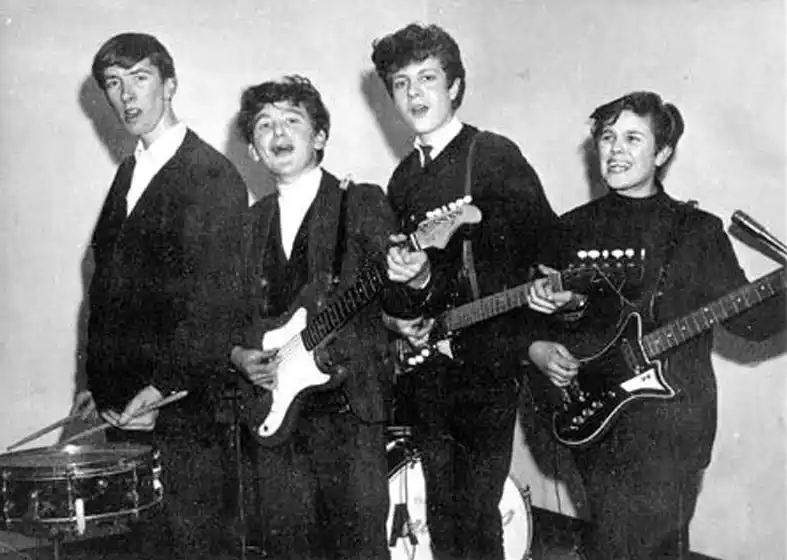
SHARD END – BIRMINGHAM
Actualizado en noviembre de 2023
JEFF LYNNE guitarra (se fue en 1965)
Rob Reader bajo (se fue en 1964)
David Walsh batería (se fue en 1964)
Dave Watson guitarra
John Kerton voz principal (se unió en 1964)
Kevin «Kex» Gorin batería (se unió en 1964)
Dave Merrick bajo (se unió en 1964 – se fue en 1966)
Robert «Willie» Watson armónica (se unió en 1964 – se fue en 1965)
Jake Commander guitarra (se unió en 1965)
Malcolm Garner bajo (se unió en 1966)
Mike Heard guitarra principal (se unió en 1966)
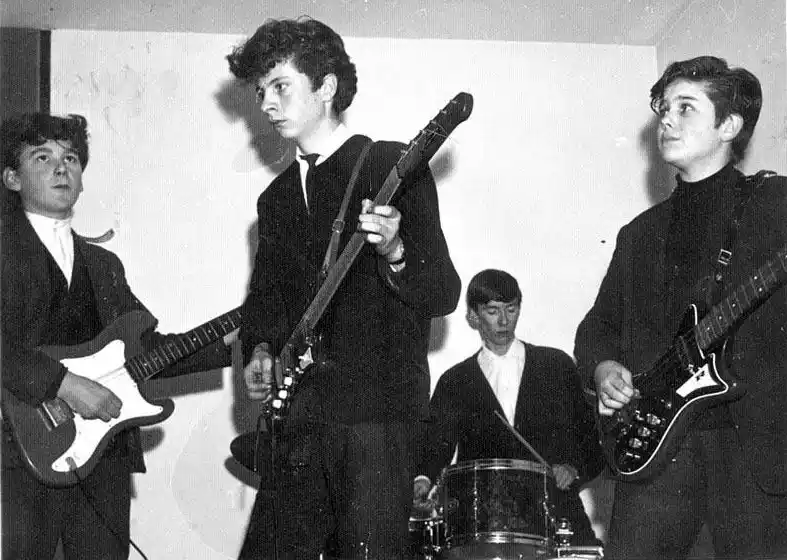
«Sábado por la noche en el estanque de los patos»
Esta banda es importante en la historia de la música rock por ser la primera en la que participó JEFF LYNNE, quien luego lideraría la mundialmente famosa ELECTRIC LIGHT ORCHESTRA (ELO). THE ANDICAPS fueron formados a principios de 1963 por cuatro adolescentes que vivían en la zona de Shard End en Birmingham.
El bajista Robert (Bob) Reader y el baterista David Walsh fueron alumnos de la escuela secundaria masculina Alderlea Boys Secondary School. Los guitarristas David Watson y JEFFREY LYNNE vivían en Shard End Crescent.
JEFF LYNNE nació en Birmingham el 30 de diciembre de 1947 y vivía con sus padres en una casa de protección oficial en el 368 de Shard End Crescent. Cuando era estudiante, JEFF fue a un concierto de Del Shannon en el ayuntamiento de Birmingham y quedó tan impresionado que su principal ambición fue unirse a una banda. ROY ORBISON fue otra de las primeras influencias del joven JEFF LYNNE, así como Chuck Berry, The Shadows y, más tarde, por supuesto, The Beatles.
El talento natural de JEFF para la música le permitió dominar el piano y la guitarra. Pasó muchas horas practicando en la sala de estar de la casa de sus padres, donde también experimentó haciendo grabaciones con una grabadora antigua. Esta temprana experiencia en grabaciones caseras le resultaría valiosa más adelante en su carrera.
Rob Reader recuerda: «Yo tenía sólo catorce años y todavía estaba en la escuela cuando Jeff formó los Andicaps y me convertí en el bajista del grupo. Jeff era un guitarrista autodidacta e incluso me enseñó a tocar el bajo».
JEFF, Rob y Dave empezaron a tocar guitarras españolas antes de comprar todos los instrumentos eléctricos que podían permitirse. Lo que les faltaba a la formación en recursos económicos, sin duda lo compensaban con entusiasmo.
La banda se llamó originalmente «THE ROCKIN’ HELLCATS», pero Dave Walsh (que solo tenía un pad de práctica para baterista) tuvo que ahorrar para comprarse una batería, lo que dio lugar a su idea de cambiar el nombre del grupo a «THE HANDICAPS». Esto se modificó sabiamente a «THE ANDICAPS» para evitar ofender a las personas con discapacidad.
En la parte superior de esta página se muestra la primera fotografía histórica de THE ANDICAPS tomada por el padre de Dave Walsh. La formación, de izquierda a derecha, está formada por Dave Walsh, Dave Watson, JEFF LYNNE y Rob Reader. El joven grupo muestra con orgullo sus nuevos instrumentos, incluida la guitarra eléctrica «Burns Sonic» de JEFF.
THE ANDICAPS ensayaban regularmente en el Shard End Community Centre y fue allí donde el padre de Dave Walsh les consiguió su primer concierto para tocar en un baile por el que la banda recibió la suma de cinco libras. THE ANDICAPS fueron bien recibidos y terminaron tocando allí todos los viernes.
En aquellos primeros tiempos, la banda sólo interpretaba temas instrumentales de grupos como «The Shadows» y «The Ventures». JEFF LYNNE en aquel momento no tenía la confianza para cantar frente a un público y, de todos modos, la banda no podía permitirse su propio sistema de sonido.
«Logramos entrar a la fuerza y siempre nos quedamos como ‘nerds’ frente a la banda para que Jeff pudiera ver lo que «Mo» estaba tocando en la canción principal».
Dave Walsh recuerda: «El Harlequin Pub estaba más o menos a medio camino entre mi casa y la de Jeff. Los Modernaires eran la banda residente y otros grupos también tocaban allí los martes por la noche. Todos los Andicaps eran demasiado jóvenes para entrar, así que Jeff y yo nos quedábamos cerca de las puertas de afuera, inmediatamente adyacentes al quiosco de música, y podíamos escuchar bien».
«También nos dio la oportunidad de hablar con las bandas cuando cargaban y descargaban su equipo en el pub. Pronto pudimos entrar a la fuerza y siempre nos paramos como un nerd frente a la banda para que Jeff pudiera ver lo que «Mo» (Maurice Jones) estaba tocando y yo pudiera babear por las sutilezas y el estilo relajado y completamente natural de tocar de Tony Finnister».
THE ANDICAPS debieron ser buenos, ya que pronto fueron entrevistados para un artículo en un periódico local donde se mencionaba que el grupo había gastado casi 300 libras en equipo. El artículo continuaba diciendo que JEFF LYNNE estaba escribiendo canciones para que el grupo las interpretara en el escenario. Uno de sus primeros trabajos fue un número instrumental escrito para la banda titulado «ANDICAPPED» pero incluso entonces, JEFF mostró interés en las composiciones clásicas.
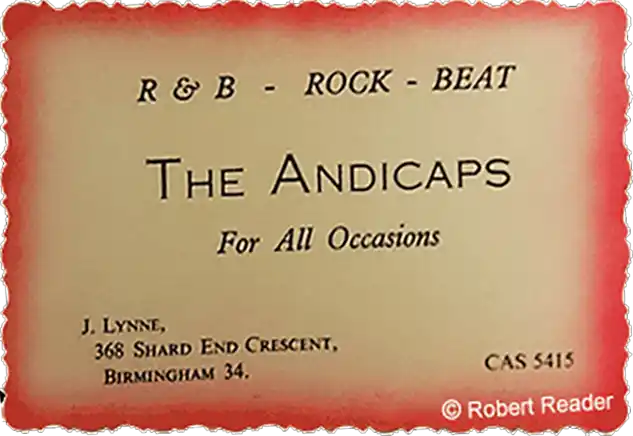
THE ANDICAPS interpretaron una versión del famoso «Lago de los cisnes» de Tchaikovsky como un arreglo de ritmo rápido aparentemente titulado «Saturday Night At The Duck Pond», probablemente el mismo disco de «The Cougars» que llegó a las listas de éxitos en 1963. Sin embargo, las actuaciones de THE ANDICAPS incluyeron principalmente canciones que eran discos de éxito que sonaban en la radio en ese momento.
Para entonces, «The Shadows» había sido reemplazado por «The Beatles» como la banda favorita de JEFF LYNNE, por lo que muchas de sus canciones se incorporaron a los espectáculos de THE ANDICAPS. Un cantante principal se consideraba ahora una parte esencial de la banda y John Kerton fue contratado como vocalista. THE ANDICAPS comenzaron a tocar en muchos más conciertos en Birmingham, incluidas reservas semanales en el Regal Cinema en Handsworth, donde tocaban sets entre las funciones de cine matinales del sábado.
«El padre de Dave Walsh era camionero, así que todo el equipo iba en la parte trasera de su camión mientras viajábamos en el autobús número cincuenta y cinco hasta el lugar del evento».
Rob Reader dijo: «La mayoría de nuestros conciertos fueron en Shard End y sus alrededores. Como éramos demasiado jóvenes para conducir, trasladar el equipo era un desafío. En una ocasión, tuvimos que tocar en una recepción de bodas en Nechells. El padre del baterista Dave Walsh era camionero, así que todo el equipo fue en la parte trasera de su camión mientras viajábamos en el autobús número cincuenta y cinco hasta el lugar del evento. ¡Qué días más felices!»
Como sucede con muchas bandas amateurs que se forman a una edad temprana, después de dejar la escuela hubo cierta presión para encontrar «trabajos decentes». JEFF fue a trabajar a una fábrica, pero no renunció a su sueño de convertirse en músico profesional.
Dave Walsh dejó THE ANDICAPS en 1964. Según Dave, «Jeff y yo siempre nos peleábamos (¡nada nuevo allí!) y me propusieron unirme a The Boulevards, que eran considerados con razón la mejor banda de la zona de Shard End/Kinghurst» . Más tarde, Dave ayudó a formar la banda de Brum Second City Sound, que tuvo un éxito en 1966 con el disco de estilo clásico «Tchaikovsky One».
JEFF LYNNE pronto incorporó a Kevin «Kex» Gorin a la batería y a Dave Merrick como bajista para sustituir a Rob Reader, que también se marchaba. El hermano de Dave Watson, Rob Watson, se unió a THE ANDICAPS durante un breve periodo como armonicista, lo que le dio a la banda un sonido más basado en el blues.
A pesar de haber ganado el segundo puesto en un concurso local para «Banda del año», JEFF LYNNE tenía ambiciones musicales que iban más allá de las que ofrecían THE ANDICAPS y anhelaba «convertirse en profesional» con una banda establecida. Fue con este objetivo que JEFF dejó THE ANDICAPS a fines de 1964 y se unió a un grupo local muy conocido llamado «THE CHADS» como reemplazo de su guitarrista principal saliente Mick Adkins.
«En Alemania vimos a Inglaterra ganar el Mundial antes de subir al escenario. ¡Por suerte no nos dieron una paliza!»
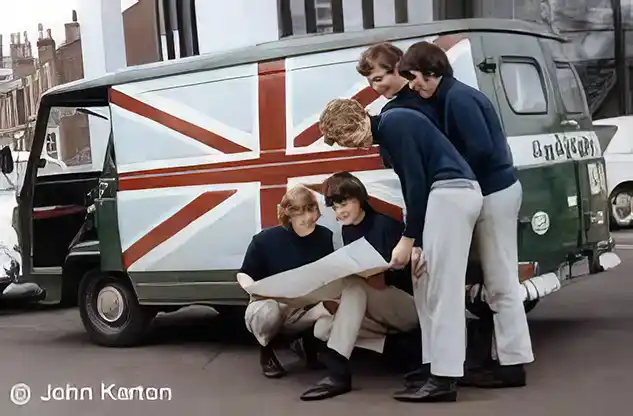
THE ANDICAPS restantes votaron por continuar, así que después de contratar a Jake Commander para reemplazar a JEFF LYNNE en la guitarra principal, consiguieron un representante adecuado y comenzaron a realizar muchas más contrataciones. La banda se fue a Alemania en mayo de 1966 con su camioneta con una gran bandera de Union Jack pintada en ella.
John Kerton recuerda: «En Alemania vimos a Inglaterra ganar el Mundial antes de subir al escenario. ¡Por suerte no nos dieron una paliza!». THE ANDICAPS también visitaron Laponia en 1966, convirtiéndose en el segundo grupo británico en actuar allí.
El bajista Dave Merrick dejó THE ANDICAPS y fue reemplazado por Malcolm Garner. Jake Commander también se fue y fue reemplazado por Mike Heard de John Bull Breed, un grupo local que tenía en su formación a John Lodge, futuro miembro de Moody Blues.
Durante una gira por Finlandia, THE ANDICAPS grabaron un sencillo que se publicó en el sello Sonet a finales de 1966. El lado A era una canción titulada «It’s So Fine» de Carter/Lewis del exitoso grupo de armonía «The Ivy League», mientras que el lado B «You Make Me Happy» fue compuesta por el guitarrista Mike Heard.
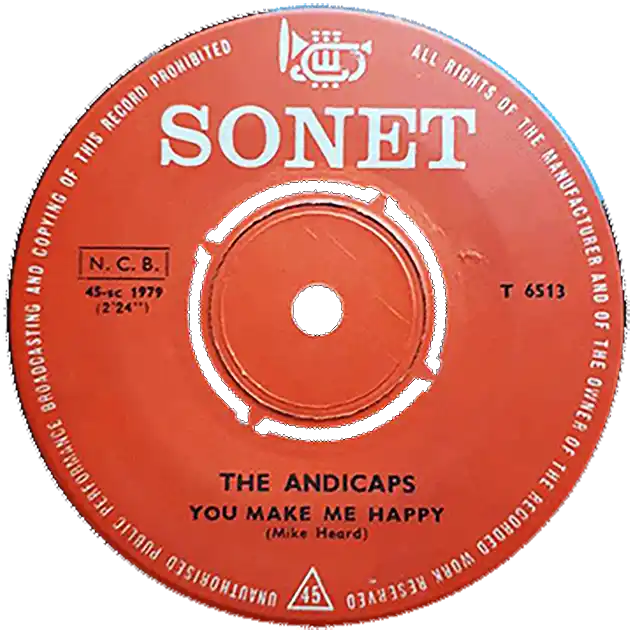
Además de encabezar el cartel, THE ANDICAPS también abrieron y apoyaron a muchas bandas y artistas famosos que eran importantes en ese momento. A pesar de la gran cantidad de contrataciones que realizó la banda, el vocalista principal John Kerton dejó el grupo en 1967.
En ese momento, la escena de la música pop estaba atravesando algunos cambios radicales. En menos de un año, THE ANDICAPS restantes también decidieron que era hora de explorar nuevos caminos musicales y el grupo se disolvió.
Malcolm Garner se unió a la «Jasper Stubbs Gloryland Band» y más tarde se unió a The Exception. Kex Gorin pasó a tocar la batería en la conocida banda de Brum «Magnum», cuyo primer álbum fue producido por su ex compañero de banda de THE ANDICAPS, Jake Commander. Jake también trabajaría para la ELECTRIC LIGHT ORCHESTRA (ELO) en la década de 1970 bajo la supervisión de JEFF LYNNE. Kex también tocó en la formación «Helicopters» de ROY WOOD a fines de la década de 1970. Lamentablemente, Kex Gorin murió de cáncer a fines de 2007.
John Kerton lideró la exitosa banda británica «Red Sun», que fue la banda residente en el Birmingham Locarno durante ocho años. Luego pasó a ser el líder de la banda del transatlántico de lujo Queen Elizabeth II. En la actualidad, John es director de su propia empresa JLP Events en el Reino Unido.
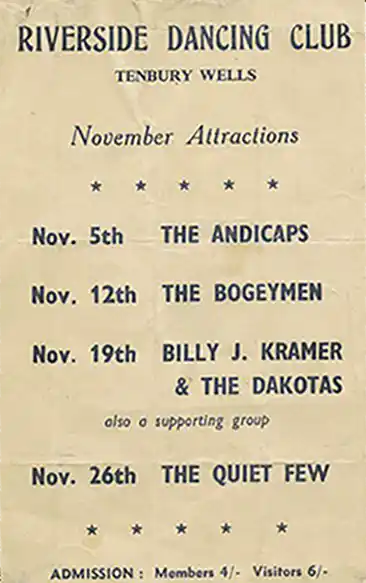
JEFF LYNNE, después de su paso por THE CHADS, se unió a los legendarios NIGHTRIDERS de Birmingham, que se convirtieron en la banda de estilo psicodélico IDLE RACE en 1967. A pesar de grabar varios discos aclamados por la crítica bajo el liderazgo de JEFF, THE IDLE RACE no logró entrar en las listas de éxitos. JEFF LYNNE se fue para unirse a THE MOVE por invitación de ROY WOOD durante el invierno de 1970.
En 1972, THE MOVE se había convertido en la ELECTRIC LIGHT ORCHESTRA (ELO) y, liderada por JEFF LYNNE, se convirtió en una de las bandas de rock británicas más exitosas de la década de 1970. Los numerosos logros musicales de JEFF están más allá del alcance de este sitio web.
En cuanto a los otros miembros originales de THE ANDICAPS, el baterista Dave Walsh , después de su paso por Second City Sound, se fue a vivir a los EE.UU., donde se convirtió en piloto de aerolínea. El guitarrista de THE ANDICAPS, Dave Watson, dejó la música para convertirse en un exitoso artista comercial y director de publicidad. El bajista de THE ANDICAPS, Robert Reader, que cumplió 70 años en 2019, vive en Chipre, donde se jubiló con su esposa Janet hace una década.
Gracias a Dave Walsh, Robert Reader, John Kerton, Jake Commander y Timo Rauhaniemi por su ayuda en la preparación de esta historia de THE ANDICAPS.
Si desea contribuir a esta página, envíe un correo electrónico a [email protected]
Derechos de autor y todos los méritos de: © John R Woodhouse
Lanzamientos de discos de THE ANDICAPS en los años 60
Singles:
It’s So Fine / You Make Me Happy (Sonet T 6513) Diciembre de 1966
ELOSPAIN:
When we at ELO ESPAÑA realized that there wasn’t a single article on our website dedicated to THE ANDICAPS, we didn’t hesitate to prepare one that would highlight the first band in which JEFF LYNNE played as a musician at the young age of 16. We found the story of THE ANDICAPS extraordinarily well-written by John R. Woodhouse, to whom we owe our thanks for his excellent work and dedication. We are now bringing his piece here, transcribed for Spanish-speaking fans, trying to preserve it exactly as it was written, without making any changes that might compromise his meticulous work…
SHARD END - BIRMINGHAM
Updated in November 2023
JEFF LYNNE guitar (left in 1965)
Rob Reader bass (left in 1964)
David Walsh drums (left in 1964)
Dave Watson guitar
John Kerton lead vocals (joined in 1964)
Kevin "Kex" Gorin drums (joined in 1964)
Dave Merrick bass (joined in 1964 - left in 1966)
Robert "Willie" Watson harmonica (joined in 1964 - left in 1965)
Jake Commander guitar (joined in 1965)
Malcolm Garner bass (joined in 1966)
Mike Heard lead guitar (joined in 1966)
"Saturday Night at the Duck Pond"
This band is important in the history of rock music for being the first in which JEFF LYNNE participated, who would later lead the world-famous ELECTRIC LIGHT ORCHESTRA (ELO). The Andicaps were formed in early 1963 by four teenagers living in the Shard End area of Birmingham.
Bassist Robert (Bob) Reader and drummer David Walsh were students at Alderlea Boys Secondary School. Guitarists David Watson and JEFFREY LYNNE lived on Shard End Crescent.
JEFF LYNNE was born in Birmingham on December 30, 1947, and lived with his parents in a council house at 368 Shard End Crescent. As a student, JEFF attended a Del Shannon concert at Birmingham Town Hall and was so impressed that his main ambition became to join a band. ROY ORBISON was another early influence on the young JEFF LYNNE, as well as Chuck Berry, The Shadows, and later, of course, The Beatles.
JEFF's natural talent for music allowed him to master the piano and guitar. He spent many hours practicing in his parents' living room, where he also experimented with making recordings using an old tape recorder. This early experience in home recording would prove valuable later in his career.
Rob Reader recalls: "I was only fourteen and still in school when Jeff formed the Andicaps, and I became the band's bassist. Jeff was a self-taught guitarist and even taught me how to play the bass."
JEFF, Rob, and Dave started playing Spanish guitars before buying all the electric instruments they could afford. What the band lacked in financial resources, they certainly made up for in enthusiasm.
The band was originally called "THE ROCKIN' HELLCATS," but Dave Walsh (who only had a drum practice pad) had to save up to buy a drum kit, which led to his idea of changing the band's name to "THE HANDICAPS." This was wisely modified to "THE ANDICAPS" to avoid offending people with disabilities.
At the top of this page is the first historic photograph of THE ANDICAPS, taken by Dave Walsh's father. The lineup, from left to right, consists of Dave Walsh, Dave Watson, JEFF LYNNE, and Rob Reader. The young group proudly displays their new instruments, including JEFF's "Burns Sonic" electric guitar.
THE ANDICAPS regularly rehearsed at the Shard End Community Centre, and it was there that Dave Walsh's father secured their first gig, playing at a dance for which the band received the sum of five pounds. THE ANDICAPS were well-received and ended up playing there every Friday.
In those early days, the band only performed instrumental tracks by groups like "The Shadows" and "The Ventures." JEFF LYNNE at the time lacked the confidence to sing in front of an audience, and anyway, the band couldn't afford their own sound system.
"We managed to sneak in and always stood like 'nerds' in front of the band so Jeff could see what 'Mo' was playing on the lead track."
Dave Walsh recalls: "The Harlequin Pub was about halfway between my house and Jeff's. The Modernaires were the resident band, and other groups also played there on Tuesday nights. All the Andicaps were too young to get in, so Jeff and I stayed near the outside doors, right next to the music kiosk, and we could hear well."
"It also gave us the chance to talk to the bands when they were loading and unloading their gear at the pub. Soon we managed to sneak in and always stood like nerds in front of the band so Jeff could see what 'Mo' (Maurice Jones) was playing, and I could drool over the subtleties and relaxed, completely natural playing style of Tony Finnister."
THE ANDICAPS must have been good, as they were soon interviewed for an article in a local newspaper, which mentioned that the group had spent nearly 300 pounds on equipment. The article went on to say that JEFF LYNNE was writing songs for the group to perform on stage. One of his early works was an instrumental number written for the band titled "ANDICAPPED," but even then, JEFF showed an interest in classical compositions.
THE ANDICAPS performed a version of Tchaikovsky's famous "Swan Lake" as a fast-paced arrangement apparently titled "Saturday Night At The Duck Pond," likely the same record by "The Cougars" that charted in 1963. However, THE ANDICAPS' performances mainly included songs that were hit records playing on the radio at the time.
By then, "The Shadows" had been replaced by "The Beatles" as JEFF LYNNE's favorite band, so many of their songs were incorporated into THE ANDICAPS' shows. A lead singer was now considered an essential part of the band, and John Kerton was hired as the vocalist. THE ANDICAPS began playing many more gigs in Birmingham, including weekly bookings at the Regal Cinema in Handsworth, where they played sets between Saturday morning movie screenings.
"Dave Walsh's father was a truck driver, so all the equipment went in the back of his truck while we traveled on the number fifty-five bus to the venue."
Rob Reader said: "Most of our gigs were in and around Shard End. Since we were too young to drive, moving the equipment was a challenge. On one occasion, we had to play at a wedding reception in Nechells. The drummer Dave Walsh's father was a truck driver, so all the equipment went in the back of his truck while we traveled on the number fifty-five bus to the venue. What happy days!"
As happens with many amateur bands formed at a young age, after leaving school, there was some pressure to find "decent jobs." JEFF went to work in a factory but did not give up his dream of becoming a professional musician.
Dave Walsh left THE ANDICAPS in 1964. According to Dave, "Jeff and I were always arguing (nothing new there!), and I was offered a chance to join The Boulevards, who were rightly considered the best band in the Shard End/Kinghurst area." Later, Dave helped form the band Brum Second City Sound, which had a hit in 1966 with the classical-style record "Tchaikovsky One."
JEFF LYNNE soon brought in Kevin "Kex" Gorin on drums and Dave Merrick on bass to replace Rob Reader, who was also leaving. Dave Watson's brother, Rob Watson, joined THE ANDICAPS briefly as a harmonica player, giving the band a more blues-based sound.
Despite having won second place in a local "Band of the Year" contest, JEFF LYNNE had musical ambitions that went beyond what THE ANDICAPS could offer and longed to "go professional" with an established band. It was with this goal that JEFF left THE ANDICAPS in late 1964 and joined a well-known local group called "THE CHADS" as a replacement for their outgoing lead guitarist Mick Adkins.
"In Germany, we watched England win the World Cup before going on stage. Luckily, we didn't get beaten up!"
The remaining members of THE ANDICAPS voted to continue, so after hiring Jake Commander to replace JEFF LYNNE on lead guitar, they secured proper management and began booking many more gigs. The band went to Germany in May 1966 in their van, which had a large Union Jack painted on it.
John Kerton recalls: "In Germany, we watched England win the World Cup before going on stage. Luckily, we didn't get beaten up!" THE ANDICAPS also visited Lapland in 1966, becoming the second British group to perform there.
Bassist Dave Merrick left THE ANDICAPS and was replaced by Malcolm Garner. Jake Commander also left and was replaced by Mike Heard from John Bull Breed, a local group that included future Moody Blues member John Lodge.
During a tour of Finland, THE ANDICAPS recorded a single that was released on the Sonet label in late 1966. The A-side was a song titled "It's So Fine" by Carter/Lewis of the successful harmony group "The Ivy League," while the B-side "You Make Me Happy" was composed by guitarist Mike Heard.
In addition to headlining, THE ANDICAPS also opened for and supported many famous bands and artists who were prominent at the time. Despite the band's many bookings, lead singer John Kerton left the group in 1967.
By then, the pop music scene was undergoing some radical changes. Within less than a year, the remaining members of THE ANDICAPS also decided it was time to explore new musical paths, and the group disbanded.
Malcolm Garner joined the "Jasper Stubbs Gloryland Band" and later joined The Exception. Kex Gorin went on to play drums in the well-known Brum band "Magnum," whose first album was produced by his former Andicaps bandmate Jake Commander. Jake would also work for the ELECTRIC LIGHT ORCHESTRA (ELO) in the 1970s under the supervision of JEFF LYNNE. Kex also played in ROY WOOD's "Helicopters" lineup in the late 1970s. Sadly, Kex Gorin passed away from cancer in late 2007.
John Kerton led the successful British band "Red Sun," which was the resident band at the Birmingham Locarno for eight years. He then went on to lead the band on the luxury transatlantic liner Queen Elizabeth II. Today, John is the director of his own company, JLP Events, in the UK.
JEFF LYNNE, after his stint with THE CHADS, joined Birmingham's legendary NIGHTRIDERS, which became the psychedelic-style band IDLE RACE in 1967. Despite recording several critically acclaimed records under JEFF's leadership, THE IDLE RACE failed to chart. JEFF LYNNE left to join THE MOVE at the invitation of ROY WOOD during the winter of 1970.
By 1972, THE MOVE had evolved into the ELECTRIC LIGHT ORCHESTRA (ELO), and under JEFF LYNNE's leadership, it became one of the most successful British rock bands of the 1970s. JEFF's numerous musical achievements are beyond the scope of this website.
As for the other original members of THE ANDICAPS, drummer Dave Walsh, after his time with Second City Sound, moved to the USA, where he became an airline pilot. THE ANDICAPS guitarist Dave Watson left music to become a successful commercial artist and advertising director. THE ANDICAPS bassist Robert Reader, who turned 70 in 2019, lives in Cyprus, where he retired with his wife Janet a decade ago.
Thanks to Dave Walsh, Robert Reader, John Kerton, Jake Commander, and Timo Rauhaniemi for their help in preparing this history of THE ANDICAPS.
If you would like to contribute to this page, please email [email protected]
Copyright © John R Woodhouse
THE ANDICAPS' 1960s Record Releases
Singles:
It's So Fine / You Make Me Happy (Sonet T 6513) December 1966

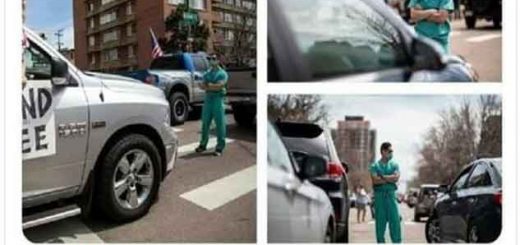
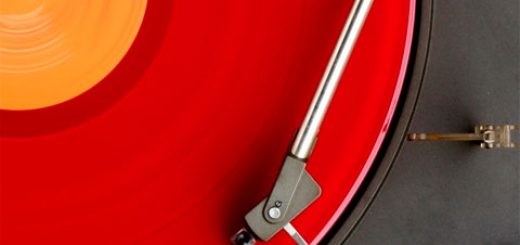
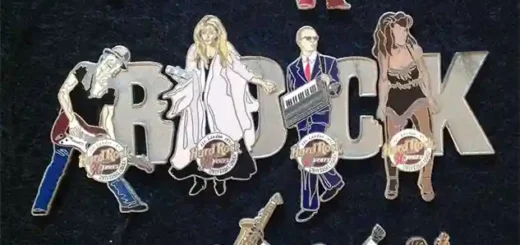
Extraordinario artículo. Muy interesante.
Muy interesante trabajo de documentación…
Conocer en profundidad los orígenes en estos precisos momentos, contextualiza y da más valor a la historia musical del Jeffe.